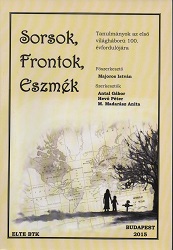A háború gazdasági hatásai Közép-Európában
Economic Effects of the War in Central Europe
Author(s): Ferenc Szávai
Subject(s): Economic history, Political history, Interwar Period (1920 - 1939)
Published by: Eötvös Loránd Tudományegyetem, Új-és Jelenkori Egyetemes Történeti Tanszék
Keywords: government asset; inflation; disintegration; expropriation; economic self-sufficiency; Treaty of Trianon; Hungary; Austria;
Summary/Abstract: The First World War brought total economic exhaustion to the Central-European region. It caused problems in the workforce, and finances. Together with inflation, it emerged in the form of a serious government debt. The agricultural balance of the world was lost, as well as the system of financial gold standard. In this the Central-European region, the typical form of existence was the economy of self-supply, and the policy of seclusion. After the dissolution of this great economic unity, the national assets became the possession of the former member states of the Monarchy, however, in numerous cases it gave grounds for quarrels and complaints. This study focuses on the cases of options, pension provisions and old korona accounts.
Book: Sorsok, frontok, eszmék. Tanulmányok az első világháború 100. évfordulójára
- Page Range: 69-84
- Page Count: 16
- Publication Year: 2015
- Language: Hungarian
- Content File-PDF

